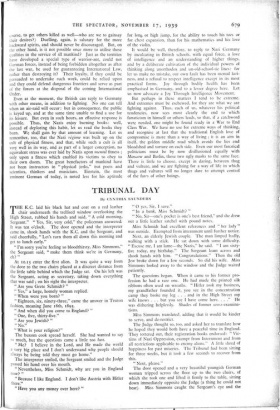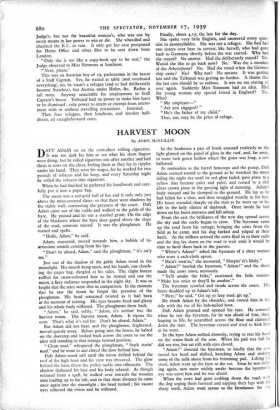TRIBUNAL DAY
By CYNTHIA SAUNDERS
THE K.C. laid his black hat and coat on a red leather chair underneath the trellised window overlooking the High Street, rubbed his hands and said, " A cold morning, Sergeant." " Yes, Sir, very cold," the policeman answered. It was ten o'clock. The door opened and the interpreter came in, shook hands with the K.C. and the Sergeant, and said cheerfully, " Let's turn them all down this morning and get to lunch early."
" I'm sorry you're feeling so bloodthirsty, Miss Simmons," the Sergeant said, " make them think we're in Germany, eh?"
At 10.15 enter the first alien. It was quite a way from the door to the two chairs placed at a discreet distance from the little table behind which the Judge sat. On his left was the Sergeant, acting as secretary, taking down everything that was said ; on his right the interpreter.
" Are you Grete Schmidt? "
" Yes," a large, homely woman replied.
" When were you born? "
" Eighteen, six, ninety-three," came the answer in Teuton fashion, meaning June 18th, 1893.
" And when did you come to England? "
" One, five, thirty-five."
" Are you Jewish? "
" No."
" What is your religion?"
The buxom cook spread herself. She had wanted to say so much, but the questions came a little too fast.
" Me? I believe in the Lord, and He made the world a very big place and I don't understand why people should always be being told they must go home."
The interpreter smiled, the Sergeant smiled and the Judge passed his hand over his mouth.
" Nevertheless, Miss Schmidt, why are you in England now? "
"Because I like England. I don't like Austria with Hitler there."
" Have you any money over here? " " 0 yes, Sir, I save."
" In a bank, Miss Schmidt? "
" No, Sir—one's pocket is one's best friend," and she drew out a little leather satchel with pound notes..
Miss Schmidt had excellent references and " her lady " was outside. Exempted from internment until further notice.
Next, an elderly Jewish couple. The man limped badly, walking with a stick. He sat down with some difficulty. " Excuse me, I am lame—the Nazis," he said. " I am sixty- five today, my birthday." The Sergeant leant across and shook hands with him. " Congratulations." Then the old Jew broke down for a few seconds. So did his wife. Miss Simmons looked away to the window and the Judge waited patiently.
The questions began. When it came to his former pro- fession he had a rare one. He had made the printed silk ribbons often used on wreaths. " Hitler took my business, my grandfather founded it, you see in the concentration camp they broke my leg . . . and in the High Street my wife knows . . . but you see I have come here. . . ." He was dithering helplessly. Shades of former cross-examina- tions.
Miss Simmons translated, adding that it would be kinder to serve, and de-restrict.
The Judge thought so, too, and asked her to translate how he hoped they would both have a peaceful time in England. They tottered out, their registration books endorsed: " Vic- tims of Nazi Oppression, exempt from Internment and from all restrictions applicable to enemy aliens." A little shred of happiness for past miseries. The Tribunal had been sitting for three weeks, but it took a few seconds to recover from this.
" Next, please."
The door opened and a very beautiful youngish German woman tripped across the floor up to the two chairs, of which she took one and lifted it firmly to the table, sitting down immediately opposite the Judge (a thing he could not bear). Miss Simmons caught the Sergeant's eye and the Judge's, but not the beautiful woman's, who was out by every means in her power to win or die. She wheedled and charmed the K.C. in vain. It only got her case postponed for Home Office and other files to be sent down from London.
" Only she is too like a copy-book spy to be real," the Judge observed to Miss Simmons at luncheon.
" Next, please.'
This was an Austrian boy of 19, parlourman in the house of a Staff Captain. Yes, he waited at table (and overheard everything), no, he wasn't a refugee (and so had deliberately become Stateless), but Austria under Hitler, &c. Rather a tall story. Anyway unsuitable for employment in Staff Captain's house. Tribunal had no power to make him leave or be dismissed ; only power to intern or exempt from intern- ment with or without travelling restrictions. Interned.
Then four refugees, then luncheon, and another half- dozen, all straightforward cases. Finally, about 4.15, the last for the day.
She spoke eery little English, and answered every ques- tion in monosyllables. She was not a refugee. She had had two sisters over here in service, like herself, who had gone back to Germany shortly before the war started. Why had she stayed? No answer. Had she deliberately stayed? Yes. Would she like to go back now? No. Was she a member of the Arbeitsfront? No. Had she voted when the German ship came? No? Why not? No answer. It was getting late and the Tribunal was getting no further. A shame that the last case should be so tedious. It was no use stating all over again. Suddenly Miss Simmons had an idea. Had the young woman any special friend in England? Yes. Who?
" My employer—" " Are you engaged? "
" He's the father of my child."
That, too, may be the price of refuge.





































































 Previous page
Previous page